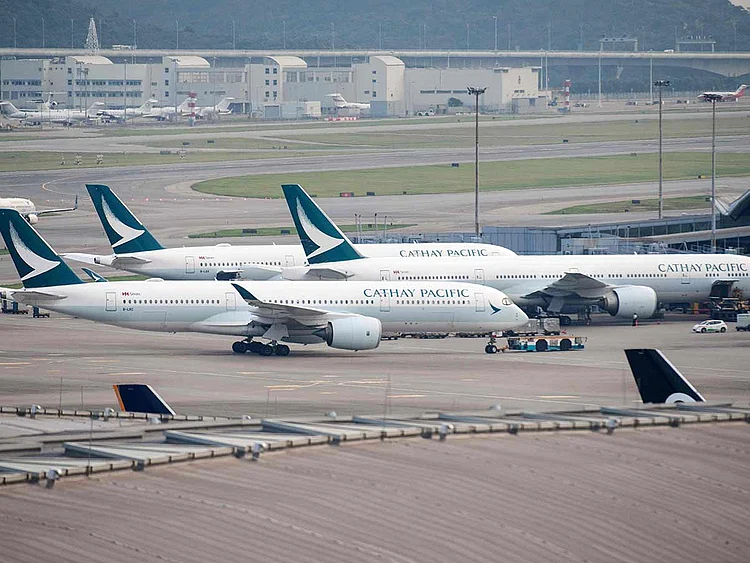Cathay Pacific cancels flights amid Airbus A350 fleet engine issues
Company didn't specify the issue it had found on the engine, which is made by Rolls-Royce

Cathay Pacific Airways Ltd. canceled almost all its scheduled flights from Hong Kong to Singapore on Tuesday, as well as a raft of other services across Asia, after discovering a faulty engine component on some of its Airbus SE A350s.
Eight of Cathay's nine scheduled Hong Kong-Singapore services on Sept. 3 were scrapped, according to the airline's website. The only flight still due to depart as of Tuesday mid-morning was an afternoon connection on a Boeing Co. 777.
Meanwhile, nearly half of Cathay's services on Tuesday from Hong Kong to Bangkok and those to Tokyo's Narita airport have also been axed. Of those still running, none are on an A350 aircraft. Cathay has said some 48 individual flights, including return legs, have been canceled.
Also Read
Cathay places $11 billion Airbus order as net profit slipsCathay Pacific set to repay Hong Kong government's $2.5 billion COVID loanCathay Pacific launches direct flights from Hong Kong to RiyadhCathay Pacific pilot trainees banned from solo flights as planes damagedThe Hong Kong-based airline, among the biggest operators of the European planemaker's marquee jet, said it identified an engine component failure on an A350 aircraft that was forced to return from its flight to Zurich on Monday. A subsequent check of the fleet uncovered 'a number of the same engine components that need to be replaced,' Cathay said in a statement.
The company didn't specify the issue it had found on the engine, which is made by Rolls-Royce Holdings Plc. The engine maker said in a statement that it's 'committed to working closely with the airline, aircraft manufacturer and the relevant authorities to support their investigation into this incident,' while Airbus referred to the engine maker and the airline for comment.
Rolls-Royce fell as much as 8.2 per cent in London trading, the biggest drop in two years. While the cause of the possible fault isn't known, investors have grown wary in recent years of engine issues as a disruptive force in the aviation industry. Many smaller Airbus A320neo jets that are powered by the Pratt & Whitney engine have suffered glitches, temporarily grounding some of the workhorse fleet at airlines including Wizz Air Holdings Plc, India's IndiGo and Deutsche Lufthansa AG.
The Rolls-Royce engine involved in the incident, called the XWB-97, has been the subject of harsh criticism from Emirates President Tim Clark, who has called it a defective powerplant because he says it's not providing the operating cycles between required maintenance in hot and dusty environments like Dubai.
The engine maker recently committed to an extensive program to improve its range of engines, which power long-range aircraft like the A350, the older A330neo and the Boeing Co. 787 Dreamliner.
The fleet-wide inspection of Cathay's 48 A350 aircraft will mean that some of its planes will be out of service "for several days," impacting schedules, the company said. The carrier has canceled 24 return flights up until the end of Tuesday, it said.
European aviation regulator EASA said in a statement that it's been informed of the incident affecting Cathay's A350 and that it's in touch with Airbus and Rolls-Royce.
"We will be monitoring any information coming out of the technical investigation and take decisions for any fleet level action as required," an EASA spokeswoman said.
Monday's stock slump marks a reversal of fortune for Rolls-Royce, whose shares have surged in the past two years on optimism that the company is more disciplined on costs and is focused on more lucrative programs.
Rolls-Royce is the sole engine provider for the Airbus A350, which comes in two sizes: the smaller -900 variant and the larger -1000 type. The aircraft, which is made partially of lightweight composite components, competes with the 787 Dreamliner and the 777 models.
Cathay has been a loyal Airbus customer in recent years, and placed an order just last month for as many as 60 Airbus A330neo twin-aisle jets. Boeing last won an order from Cathay in 2013.
Sign up for the Daily Briefing
Get the latest news and updates straight to your inbox
Network Links
GN StoreDownload our app
© Al Nisr Publishing LLC 2026. All rights reserved.